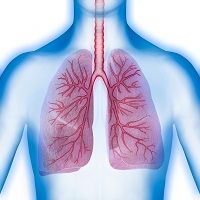Article
No Association Between Muscle Atrophy, Nutrient Depletion and Airway Inflammation in COPD Patients
Author(s):
Airway inflammation, a common symptom among chronic obstructive pulmonary disease (COPD) patients, does not contribute to muscle atrophy and nutrient depletion, according to researchers at the University of Leicester.

Airway inflammation, a common symptom amongst chronic obstructive pulmonary disease (COPD) patients, does not contribute to muscle atrophy and nutrient depletion, according to researchers at the University of Leicester.
For their study published in the International Journal of Chronic Obstructive Pulmonary Disease, investigators analyzed 234 COPD patients that exhibited airway obstruction. Participants demographics were documented, including their smoking history and COPD exacerbations experienced a year prior to the study’s enrollment.
Furthermore, the researchers collected sputum samples that were measured for cell counts, bacterial culture, colony forming units, and total bacterial load. To quantify differential cell counts and serum C reactive protein (CRP), blood samples were also taken.
To fulfill the study’s needs, the investigators determined a subject was experiencing muscle atrophy if their fat-free mass index (FFMI) was less than 15 kg/m2 and 17 kg/m2 in women and men, respectively. In addition, the researchers defined nutritional depletion as a body mass index (BMI) of less than 21 kg/m2. The investigators chose this BMI threshold because previous research has shown a spike in mortalities below this index among COPD patients.
The researchers repeated measurements on body composition, airway inflammation, pulmonary function, and health status for 94 patients over a 16 month period. Based on their changes in weight, they were grouped into “significant weight loss” (greater than 5 percent of the total body weight), “minimal weight change” (less than 5 percent weight loss and less than 5 percent weight gain of total body weight), and “weight gain” (greater than 5 percent of the total body weight) categories.
“We hypothesized that in patients with COPD, nutritional depletion, defined as a low body mass index (BMI) and/or low fat-free mass index (FFMI), is related to airway inflammation and that accelerated weight loss is associated with increased inflammatory parameters,” the researchers reported.
Based on BMI measurements, the investigators found 11 percent of COPD patients were underweight, 29 percent were normal weight, 34 percent were overweight, and 27 percent were obese. Nutritional depletion was witnessed in 86 (37 percent) patients. Among subjects with nutritional depletion, they experienced impaired lung function and elevated peripheral blood neutrophil counts.
Specifically, 20 patients had both a low BMI and low FFMI, six had a low BMI and a normal FFMI, and 60 had a normal BMI and low FFMI. Furthermore, there was no discernable association between airway inflammation and bacterial colonization in patients, regardless if they experienced nutritional depletion.
The investigators touted their research as the first cross-sectional and longitudinal study which explored bacterial load and body composition in persons with COPD. “Nutritional depletion and progressive muscle atrophy are not related to airway inflammation, further suggesting that overspill of pulmonary inflammation is not a key driver of nutritional depletion in COPD,” the authors concluded.


